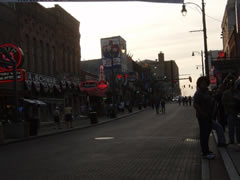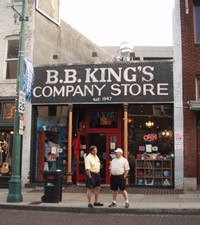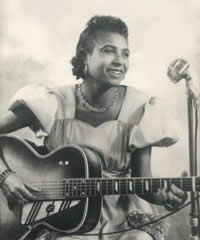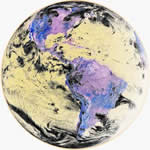Goin’ Down to Memphis:
Beauty and the Blues
By Brook & Gaurav Bhagat

Real blues, in a voice, a chord, or a single soulful note of a 100-year-old harp or an angelic electric guitar is liquid emotion, a drop of pure life. It makes the distance between hearts, minds and time disappear. The blues is not a self-indulgent celebration of sadness; it is a celebration of life without a filter, of humanity without a mask. There are joyful blues, laughing, stomping, swinging and grinding blues; but melancholy and madness and love and loss are also part of our human experience, and they have their sweetness, their depths. They also deserve to be sung about. The funny thing is, as a wise man once said, when you sing the blues, you lose the blues… you yourself disappear, and what is left is real. I have loved the blues madly for the better half of my life, and a three-day road trip to Memphis, Tennessee, the blues capital of the world, was a dream come true for me.

The Memphis air in March was intoxicatingly rich and sweet, warm and heavy with the fragrance of sugarberries, cherry blossoms, magnolias and flowering dogwood trees. Being near sea level in elevation, it was easy and enjoyable just to close our eyes and breathe it in. Drinking the water was another simple pleasure: straight out of the tap, it’s just as clean and sweet as the air. Memphis sits on a natural aquifer that provides the city with artesian water, which is naturally soft and pure. This delicious water comes from between 350 and 1100 feet underground, and it tastes as rare, clean and fresh as it sounds.
Memphis knows what it’s famous for, and it lives up to its musical reputation. Any day of the week, you can hear and almost feel the ghosts of royalty like B.B. King, Aretha Franklin, Muddy Waters, Bessie Smith, Johnny Cash, Howlin’ Wolf and Otis Redding—to name a few-- sitting in the sun, jamming with the live heirs to their thrones. Memphis is the birthplace of the Memphis blues, Memphis soul, gospel and, many would argue, rock n’ roll. With our toddler in tow, we didn’t have the luxury of  checking out the nighttime blues scene in the numerous bars and clubs which boasted live music, but it didn’t matter—in Memphis, the blues still reign supreme 24 hours a day, and all you really need is heart, soul, and a harmonica in your pocket. Just walking down the infamous Beale Street, we got one opportunity after another to sit, listen, drink, and finally get up and dance and play to live Memphis blues in the many outdoor restaurants and patios. B.B. King was in fact once known as the “Beale Street Blues Boy,” for the fertile pavement where he began singing and playing full-time; he shortened the handle to “Blues Boy King,” and the rest, as they say, is history.
checking out the nighttime blues scene in the numerous bars and clubs which boasted live music, but it didn’t matter—in Memphis, the blues still reign supreme 24 hours a day, and all you really need is heart, soul, and a harmonica in your pocket. Just walking down the infamous Beale Street, we got one opportunity after another to sit, listen, drink, and finally get up and dance and play to live Memphis blues in the many outdoor restaurants and patios. B.B. King was in fact once known as the “Beale Street Blues Boy,” for the fertile pavement where he began singing and playing full-time; he shortened the handle to “Blues Boy King,” and the rest, as they say, is history.

These are the same streets master blues guitarist Memphis Minnie ran away to at the tender age of thirteen. Located in the southwestern tip of Tennessee, Memphis in many ways has more in common with Mississippi, the bordering river state many would argue the blues were born in, or at least grew up in, around the dawn of the twentieth century. Memphis marks the beginning of the Mississippi delta, for which the Delta Blues are named; in the Memphis blues, it’s easier to hear the blood relation to the rich rural country blues of Mississippi than the shiny sound of faraway Nashville, Tennessee. Literally, too, many of the blues greats that made Memphis famous had migrated there from small towns in Mississippi; some of them, like Howlin’ Wolf and Muddy Waters, eventually continued on to Chicago to help create the electric sound of the Chicago blues. Memphis Minnie, born Lizzie Douglas in Algiers, Louisiana, and raised in Walls, Mississippi, was there in Chicago, too, jamming electric with the best of them, but she always considered Memphis to be her home, and she always came back.
By some accounts, Memphis Minnie got her first guitar for Christmas when she was seven years old; others say she was ten. Either way, one thing’s sure: even as a child, she could see clearly what her future would hold in Walls, as a sharecropper or domestic worker; she disliked physical labor and wanted no part of it. She had mastered both the guitar and banjo, and was  already playing at parties. At thirteen, she set out for Memphis, playing for tips at Church’s Park (now W.C. Handy Park) on Beale Street. She played the street corners and juke joints for most of her teenage years, returning to Walls only when she ran out of money. The life of a bluesman was dangerous, and there were virtually no blueswomen at all; but “Kid” Douglas, as she was known at the time, didn’t give a damn.
already playing at parties. At thirteen, she set out for Memphis, playing for tips at Church’s Park (now W.C. Handy Park) on Beale Street. She played the street corners and juke joints for most of her teenage years, returning to Walls only when she ran out of money. The life of a bluesman was dangerous, and there were virtually no blueswomen at all; but “Kid” Douglas, as she was known at the time, didn’t give a damn.
Memphis Minnie could throw a mean right hook when she needed to, and she chewed and spit tobacco, even spitting in the middle of a song without missing a beat. Although she played with other notable musicians, Minnie was a one-woman show-- a musician who also sang, not a female singer with an all-male band behind her, like almost all the other female vaudeville blues and jazz singers of her time. Perhaps she compensated for being the only woman in a man’s field by wearing the most feminine things she could imagine—huge, fluffy chiffon gowns, pearls, fancy jewelry. That didn’t stop her from using her street smarts when she needed them, though—Minnie knew her own worth, and could take care of herself. Her fame grew, and she was eventually recognized as the musical diamond she was. On the guitar and on the street, she could keep up with the best of them.
In 1933, a now legendary blues contest was held in a Chicago nightclub, featuring Memphis Minnie and Big Bill Broonzy. As Big Bill himself tells it in his autobiography, a jury of fellow musicians had to proclaim Memphis Minnie the winner after hearing her “Chauffeur Blues” and “Looking the World Over.” Broonzy grabbed half the prize—a bottle of whiskey—and drank it under a table while Minnie was carried off, victorious, on the shoulders of her contemporaries.

As for me, just soaking in the sunshine and stories of the greats and bending out my own humble blues harp on Beale Street was enough to let me feel like a little bit of Memphis had seeped in. We vowed to return, whenever fate allows it, for Memphis in May, a month-long celebration that begins each year with the Beale Street Music Festival. The three-day festival showcases some of the biggest names in music— like, in 2013, The Black Keys, Patti Smith, Public Enemy and Gary Clark, Jr., to name a few—alongside local talent. A hundred years after pioneers like Memphis Minnie put the place on the map, Memphis is still in full bloom, the fragrance of the blues lingering in the the dogwoods, sweeter than sugarberry wine. Here, the blues are still alive, as old as time and as new as your joy, your pain, your very life. If you listen, you can hear them calling you: don’t be shy. Don’t be scared, don’t be ashamed. Stand up and sing the blues.
Did you like the article? Subscribe here to our New Article Email Alert or RSS feeds.
Sharing is caring! Don't forget to share the love, and keep the conversation going by leaving a comment below:
Advertisement
